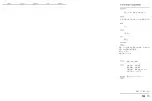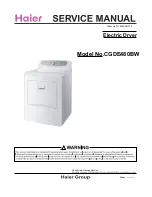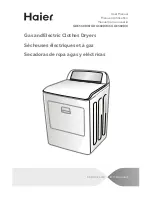
12_
installing your dryer
If the new dryer is installed into an existing exhaust system you must make
sure:
•
The exhaust system meets all local, state, and national codes.
•
That a fl exible plastic duct is not used.
•
To Inspect and clean all lint buildup from inside the existing duct.
•
The duct is not kinked or crushed.
•
The exhaust hood damper opens and closes freely.
The static pressure in any exhaust system must not exceed 0.83 inches of water column, or be
less than 0.
This can be measured with the dryer running with a manometer at the point where the exhaust
duct connects to the dryer. A no-heat setting should be used. The dryer tumbler should be
empty and the lint fi lter clean.
IMPORTANT TO INSTALLER
Please read the following instructions carefully before installing the dryer. These instructions should be kept
for future reference.
Remove the door from all discarded appliances to avoid the danger of a child suffocating.
LOCATION CONSIDERATIONS
The dryer should be located where there is enough space at the front for loading the dryer, and enough
space behind for the exhaust system. This dryer is factory-ready for rear exhaust. To exhaust out the
bottom or the right or the left, use the accessory exhaust kit. Instructions are included with the kit. It’s
important to make sure the room has enough fresh air. The dryer must be located where there is no air-fl ow
obstruction.
On gas dryers, adequate clearance as noted on the data plate must be maintained to ensure adequate air
for combustion and proper dryer operation.
The dryer must not be installed or stored in an area where it will be exposed to water and/or weather. The
dryer area is to be kept clear of combustible materials, casoline, and other fl ammable vapors and liquids. A
dryer produces combustible lint. The area around the dryer should be kept Lint-Free.
installing your dryer
WARNING
DV511AEW-02836D_EN.indd Sec2:12
DV511AEW-02836D_EN.indd Sec2:12
2011-05-16
5:06:19
2011-05-16
5:06:19













































